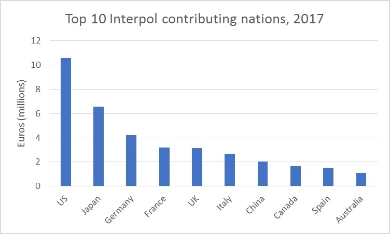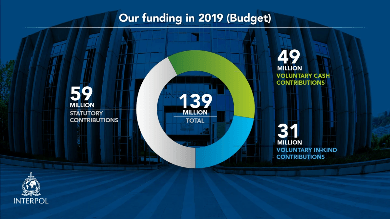Ai Powers Interpol's Policing
Interpol is the second largest international organization, behind the United Nations, with a membership of 194 different countries. The organization is built on a network of national central bureaus in each member state, with support from Regional Bureaus, the General Secretariat in Lyon, France and their Global Complex for Innovation in Singapore.
Interpol opened a new cybercrime-fighting complex in Singapore in 2014. INTERPOL GCI, or Global Complex for Innovation is at the forefront of technological innovation in International Law Enforcement. The complex is actively engaged with private sector technology companies to develop the next generation of crime fighting technology.
For the last few decades, INTERPOL has led the global fight against human trafficking, drugs, terrorism, crimes against children, corruption, organized crime and illicit trade by embracing technology and increasing capacity across all of their member states.
Starting with the introduction of the I24/7 network and the Mobile/Fixed Interpol Network Database (MIND/FIND), the organization modernized significantly under the guidance of Ronald K. Noble (USA). In fact, now there are over 100 million police files consulted 230 times a second in 194 countries globally. From 1989 to to 2019 the organization grew from 250 staff to over 1,000.
Ai has been used by Interpol for over a decade for racial recognition matches, but in 2017 the General Assembly, which is INTERPOL’s version of the governing council, approved 7 strategic goals for the future of Global Policing. These 7 strategic goals greatly rely on the use of Ai. In 2018, INTERPOL announced that they are actively looking at harnessing AI and Robotics as they focused on innovation to improve the capacity of member states to combat crime.
Nowadays, international experts from around the globe work together to use AI and Machine Learning to incorporate facial recognition, trend identification, deep web/dark web analytics and encrypted image comparison into modern day policing.
One of the first use cases and possibly one of the most successful tools in the international fight against child sexual exploitation was INTERPOL’s ICSE. With the support of academic research and the participation of member states, the organization was able to create an encrypted database and use machine learning to compare international images.
This removed any need to share images with investigators in other countries, and streamlined investigations and avoid duplication of effort across the globe. Since the introduction of the database, over 19,400 victims have been identified and according to recent numbers almost 9,000 offenders have been identified.
At present the biggest challenge for the organization in it’s push for innovation is the scaling of capacity to developing countries.

Every country pays a portion of GDP to fund Interpol's work. In 2019 the INTERPOL received around $65 million in statutory contributions, with a further $88 million received in Voluntary Funding, 95% of which came from partnerships with government agencies around the globe.

This allows countries that have capacity, to support those countries that are helping in the global fight against international crime.
Why Choose Machine Learning Investing Over A Traditional Financial Advisor?
Interview with NASA Astronaut Scott Kelly: An American Hero
Interview With Home Depot Co-Founder Ken Langone
Interview with the Inventor of Amazon's Alexa
Automation and the Rebirth of American Retail
China Debuts Stealth Unmanned Combat Aerial Vehicle
Nuclear Submarines: A 7,000 Lb Swiss Watch
Ai Can Write Its Own Computer Program
On Black Holes: Gateway to Another Dimension, or Ghosts of Stars’ Pasts?
Supersonic Travel: The Future of Aviation
Shedding Light on Dark Matter: Using Machine Learning to Unravel Physics’ Hardest Questions
Aquaponics: How Advanced Technology Grows Vegetables In The Desert
The World Cup Does Not Have a Lasting Positive Impact on Hosting Countries
Artificial Intelligence is Transforming the Forex Market
Faster than Sound and Undetectable by Radar
The Implications of Machine Learning on Condensed Matter Physics & Quantum Computing
Argentina's AI Future: Reversing a Century of Decline
Tennis & Artificial Intelligence
Peru's Ai Future Will Drive Economic Growth
The Colombian Approach to the AI Revolution
Written by Paul Marrinan & Edited by Alexander Fleiss